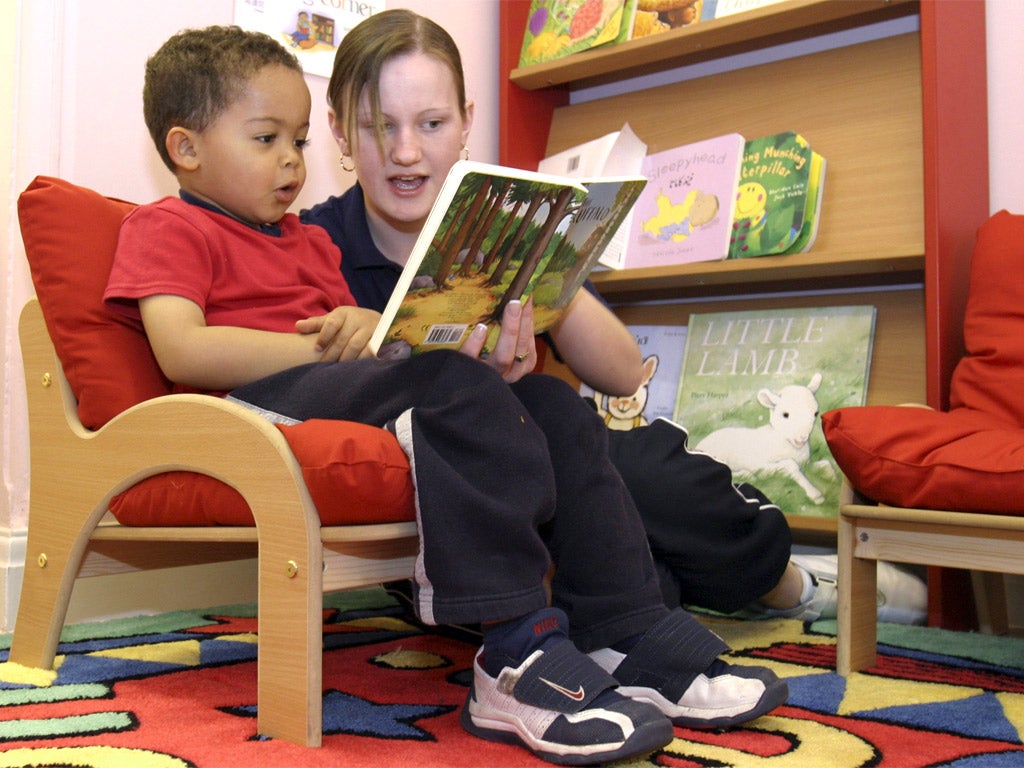Exclusive: Labour moves towards promise for free childcare for all preschoolers
IPPR report proposes a shift in spending away from Gordon Brown’s flagship tax credits

Labour is moving towards a pledge to bring in universal state-funded childcare for preschool-age children if it regains power at the 2015 general election, The Independent can disclose.
Senior Labour figures say they want to include a “big offer” on childcare in its manifesto. Options include ensuring a children’s centre in every neighbourhood in an improved Sure Start programme, reversing cuts which have seen about 400 of the 3,000 centres close since the 2010 election.
Labour’s thinking will be heavily influenced by a study published today by the Institute for Public Policy Research (IPPR), a think-tank with close links to the party. It argues that a huge expansion of childcare would pay for itself over time. Many mothers would go back to work if there were better affordable childcare. The IPPR calculates that attracting 280,000 back into the labour market would save almost £1.5bn in extra tax revenue and lower spending on benefits and tax credits.
The report proposes a shift in spending away from Gordon Brown’s flagship tax credits, admitting that with hindsight it might have been better to spend the money on a Scandinavian-style system of state-funded childcare rather than giving people handouts.
Labour has already promised to increase to 25 hours a week the 15 hours of “free” childcare for three- and four-year-olds introduced by the Coalition. But there are growing signs that Labour will go further in a significant extension of Ed Miliband’s campaign on the “cost-of-living crisis”. Childcare is a front-runner to be included on Labour’s 2015 “pledge card”, along with the promise to freeze energy prices for 20 months and build at least 200,000 homes a year by 2020. Party strategists believe an expansion of childcare would be a big vote-winner in key marginal seats.
It is not yet clear how much money Labour would “invest” in childcare at an election when its spending plans will come under intense scrutiny. Universal free provision would cost billions. One option would be free childcare for those on low incomes and subsidised low-cost provision for the better-off. The party might decide to make universal provision a long-term goal.
Lucy Powell, the shadow minister for childcare and children, told The Independent: “My job is to make the economic case and the political case. Boosting childcare is good for the economy as well as good for families.”
Speaking at the launch of the IPPR report, Jon Cruddas, the Shadow Cabinet member who heads Labour’s policy review, will hint at the party’s support for the plan, saying that Mr Miliband’s “One Nation” approach means “public services which invest in prevention not wasting money for our failure to do so”.
The IPPR’s interim Condition of Britain report says: “On reflection, Labour’s strategy [in office] did not do enough to secure the conditions for lower levels of child poverty in the absence of continued rises in benefit spending. It turned poverty reduction into something ‘done to’ families, rather than mobilising them and wider society in support of a national mission to ‘end child poverty within a generation’.”
It suggests a network of children’s centres rooted in communities rather than a top-down system run by Whitehall. It says: “Most European countries have found that a simple offer of free or low-cost places subsidised directly by the state is the most cost-effective way to guarantee access to affordable, sustainable and good-quality early education and care.”
The study rejects David Cameron’s 2010 claim that Britain is “broken”, arguing that it rediscovered the importance and value of the family during the recession. But it says families are under real strain. Nick Pearce, the IPPR’s director, said: “As society ages, and care needs rise, questions of inter-generational support and risk sharing will dominate policy debate. A new politics of the family is taking shape. At its heart is the question of how to fund, expand and reform care of children and the elderly.”
Childcare policies
Coalition
Introduced 15 hours of “free” childcare for parents of three- and four-year-olds who have not started school, for 38 weeks of the year.
Two-year-olds from poor families are also entitled to 15 hours. The proportion of those covered will double to 40 per cent next September.
From autumn 2015, parents will be able to claim back up to £1,200 a year in costs per child. For every 80p families pay, the Government will put in 20p up to the annual limit.
The £1.4bn scheme will help 2.5 million households, many more than the 450,000 under the current system. Initially open to children under five but could be extended later.
Will replace employer-supported childcare vouchers, deducted from salary before tax is paid. The saving is typically worth about £900 for a basic-rate taxpayer and £1,800 when both parents work.
Labour
Would increase the 15 hours of “free” childcare to 25 hours in £800m scheme funded through higher levy on the banks.
Legislation would ensure “wraparound” provision from 8am to 6pm in primary schools, though some could club together to provide it.
Considering plan for universal state-funded system based on improved network of children’s centres.
Join our commenting forum
Join thought-provoking conversations, follow other Independent readers and see their replies
Comments